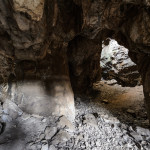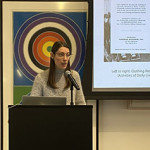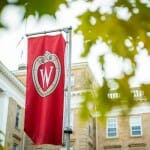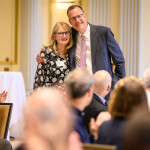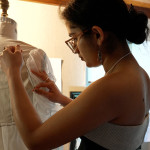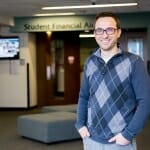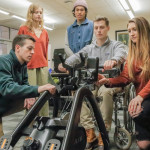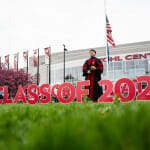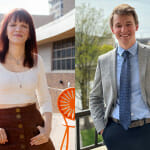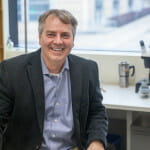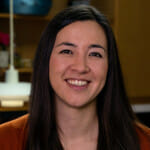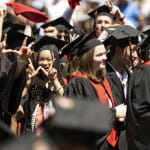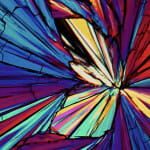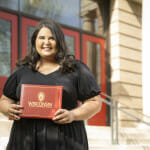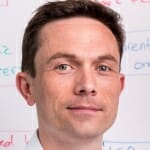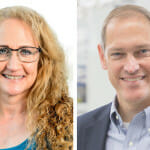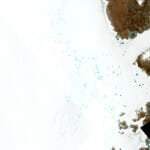Archaeologists uncover evidence of intentional burial, cave engravings by early human ancestor
Until now, scholars believed that the mental capacity behind complex cultural behaviors like burial and mark-making required a larger brain, like those of Neanderthals and Homo sapiens.
Wright wins Smithsonian fellowship for study of clothing made for disability in the post-war United States
Natalie Wright will tell you there is a much longer history of fashion designed by and for people with disabilities. This fall, Wright will have the opportunity to further explore these ideas as the 2023-24 George Gurney Predoctoral Fellow at the Smithsonian American Art Museum.
Clearer picture of watershed quality helps people put dollar values on improvements
Researchers found that when shown a range of tangible improvements to local and distant waterways, people surveyed were willing to pay more in taxes to support some, but not all, watershed restoration efforts.
La Tarte selected as DAPIR vice provost
Allison La Tarte has been selected as the vice provost for Data, Academic Planning & Institutional Research at UW–Madison. La Tarte, who has been at UW–Madison since 2014, had been the interim associate vice provost of DAPIR since January of 2022. Before that, she was the associate director of institutional research.
Meet the finalists for vice chancellor for strategic communication
Two finalists for the inaugural vice chancellor for strategic communication will visit campus and make in-person presentations next week. The candidates’ names and application materials will be shared on the search website 48 hours prior to their visit. Feedback on the candidates can be entered on the search site until 5 p.m. June 9.
A fond farewell for Provost Scholz
Members of the UW community gathered to bid a fond farewell to Provost Karl Scholz, who will become the next president of the University of Oregon on July 1.
Flowing between art and science
Now in its third year, the Flow Project highlights not only the value of art as a tool to communicate science, but also as a way to inspire new science across University of Wisconsin campuses.
SSTAR Lab project will connect Native students with financial support
UW–Madison will collaborate on a project to give Native students a comprehensive resource of college-level financial aid programs and policies.
Meet the engineers making a difference in Wisconsin communities
From Rhinelander to Trempealeau County and Cottage Grove, here are just a few examples of UW–Madison College of Engineering students and faculty stepping up to provide Wisconsin communities and businesses with expert information and tangible benefits.
Mercy, Roecker named winners of 2023 Herfurth-Kubly Awards
Recipients are selected based on high academic achievement, effective communication skills, leadership in significant extra-curricular activities, financial self-support and personal initiative.
Runge sees bioenergy hub as model for doing ‘big research’
A first-generation college student with roots in farming and forest products, Troy Runge is looking for ways university researchers can partner with industry to help solve the hardest problems and make the world a better place.
UW–Madison biochemist named HHMI Freeman Hrabowski Scholar
UW biochemistry Provessor Judith Simcox has been named to the first cohort of the Howard Hughes Medical Institute Freeman Hrabowski Scholars Program in recognition of her outstanding early-career commitment to advancing diversity, equity and inclusion in science in research.
Enter your amazing science visuals in the 2023 Cool Science Image Contest
Members of the UW–Madison community may enter up to three images by the June 15 deadline.
Biomolecular chemistry professor awarded inaugural Hanns Kuttner Professorship
This professorship fund, named for Chancellor Emerita Rebecca Blank's husband, recognizes recently tenured faculty with stellar research and teaching records and a commitment to service.
2 UW professors elected to National Academy of Sciences
Jo Handelsman and Shannon Stahl are among 120 scientists elected this year. Membership is a widely accepted mark of excellence in science and is considered one of the highest honors that a scientist can receive.
Atmospheric rivers linked to melting Greenland ice sheet
New research from UW–Madison's Space Science and Engineering Center shows the melting effects of atmospheric rivers on the ice sheet, which contains enough water to raise sea levels by 7 meters, or 23 feet.

